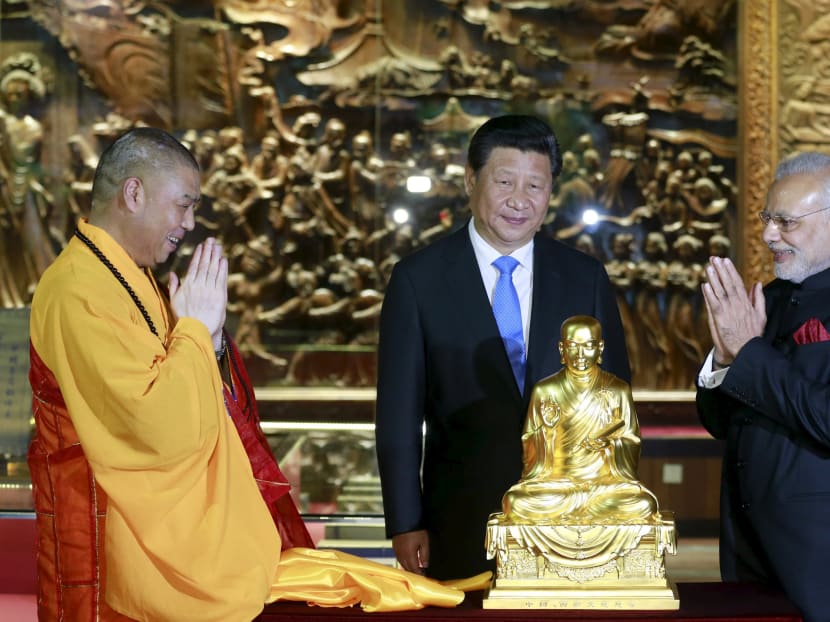India said to plan drilling off Vietnam in challenge to China
MUMBAI — India’s state-owned Oil & Natural Gas plans to revive exploration activity in waters off Vietnam’s coastline that are also claimed by China, a person with direct knowledge of the matter said.

Chinese President Xi Jinping, center, looks on as Indian Prime Minister Narendra Modi (R) receives a golden Buddha statue from a Buddhist abbot of Dacien Buddhist Temple in Xian, Shaanxi province, China, May 14, 2015. Photo: REUTERS
MUMBAI — India’s state-owned Oil & Natural Gas plans to revive exploration activity in waters off Vietnam’s coastline that are also claimed by China, a person with direct knowledge of the matter said.
The company has approval from Prime Minister Narendra Modi’s administration to drill exploratory wells in a disputed part of the South China Sea that it acquired rights to in 2006, the person said, asking not to be identified because the discussions are confidential. ONGC last attempted drilling in 2009, three years before China invited bids for the same area.
The move to assert India’s commercial rights in a contested area may be a sign Mr Modi is joining the US and other Asia-Pacific nations to check China’s territorial ambitions. Previous efforts by Vietnam and the Philippines to explore in disputed parts of the South China Sea have led to clashes with China.
“It’s clear that India has interests in the South China Sea as is evident by deepening maritime relations with the US and Japan,” said Mr Ralf Emmers, associate dean at the S Rajaratnam School of International Studies in Singapore. “And certainly China has been more active in the Indian Ocean, making Delhi a bit nervous.”
China has stepped up efforts to assert claims to more than 80 per cent of the South China Sea, which hosts UD$5 trillion (S$7 trillion) in annual shipping. It is building artificial islands and runways in the area, fuelling tension and protests by fellow claimants.
China Warning
China warned India again yesterday to avoid any exploration activities in disputed areas.
“It’s illegal if any foreign enterprise conducts activities in waters under Chinese jurisdiction without permission,” the foreign ministry said in a faxed statement. Related parties should “avoid taking actions that will make disputes complicated.”
The South China Sea is estimated to hold as much as 30 billion metric tonnes of oil and 16 trillion cubic meters of gas, which would account for about one-third of China’s oil and gas resources, according to the official Xinhua news agency.
ONGC Videsh — the New Delhi-based explorer’s overseas unit — hasn’t drilled a single well in Vietnam’s oil and gas Block 128 since it was awarded rights nine years ago.
ONGC said yesterday in an exchange filing that its partner Vietnam Oil & Gas Group, also known as PetroVietnam, has extended the permit for Block 128 to June 2016 after it expired two months ago. Officials at PetroVietnam didn’t return calls seeking comments.
India’s Navy
ONGC is also seeking renewal for Block 06.1, which has a permit that ends in 2022, the person said. The block, ONGC’s first overseas asset, started natural gas production in 2002.
ONGC is expanding its presence everywhere and Vietnam isn’t an exception, Chairman Dinesh Kumar Sarraf said in New Delhi on Aug 13. Spokesman Pallab Bhattacharya didn’t respond to two e- mails seeking comment.
The company has few reasons to be optimistic about Block 128. The company earlier abandoned adjacent Block 127 after failing to find oil or gas.
In 2012, China invited foreign companies to explore nine blocks that overlapped with Block 128 and other areas Vietnam had already awarded to companies including Exxon Mobil.
Since taking power last year, Modi has invested in India’s navy and called for protecting freedom of navigation in the South China Sea. He’s also bolstered defense ties in the region, agreeing to sell Vietnam four offshore patrol boats and approving India’s first-ever naval exercises with Australia.
Mr Vikas Swarup, the spokesman for India’s foreign ministry, didn’t answer calls to his phone or an e-mail seeking comment.
India must be cautious as it lacks the ability to match China both militarily and economically, said Mr C. Uday Bhaskar, director, Society for Policy Studies in New Delhi.
“Will India go to war with China over this?” he said. “The answer is no.” BLOOMBERG





